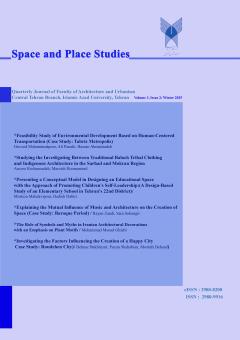Providing a Conceptual Model for Designing Educational Spaces with an Approach to Enhancing Children’s Self-Leadership: A Design-Based Study of an Elementary School in District 22 of Tehran
Subject Areas : Environmental DesignMorteza Mahdavipoor 1 , Hedieh Dabiri 2 *
1 -
2 - tehran
Keywords: Educational Space, Self-Leadership, Child-Centered Architecture, Design-Based , Independent Learning,
Abstract :
Children, as the foundation of sustainable development in any society, need environments that go beyond meeting basic needs to nurture their independent identity, sense of responsibility, and creativity. Educational spaces, especially during the elementary years, play a fundamental role in shaping children’s personality, learning styles, and social skills, acting as one of the most influential factors in this process. This study aims to develop an innovative conceptual model for designing child-centered educational spaces with an emphasis on enhancing self-leadership, conducted within elementary schools in District 22 of Tehran. The research adopts a design-based approach grounded in qualitative methodology. By focusing on concepts such as independent decision-making, conscious choice, experiential learning, and responsibility, the study seeks to establish a framework that transforms educational environments from static structures into dynamic, participatory, and empowering spaces. To achieve this goal, theoretical foundations from developmental psychology, self-directed learning theories, learning space design, and exemplary domestic and international case studies were analyzed and integrated. The findings led to the identification of key indicators at three levels: physical, spatial, and environmental, which are presented in the form of a conceptual model. This model not only offers a fresh approach to elementary school design but can also serve as a strategic tool for designers, architects, and educational policymakers, helping them create inspiring environments that foster self-directed, creative, and responsible future generations
منابع
1. اسماعیلی، س. (۱۳۷۹). کانون کودکان هزاره گفتگو. پایاننامه کارشناسی ارشد معماری، دانشگاه شهید بهشتی، دانشکده معماری و شهرسازی.
2. ایزدیاری، آرزو و ایزدیاری، فتانه. (۱۳۹۰). نقش طراحی فضای سبز بر ایجاد حس شادی در کودکان تعامل در فضاهای شهری.
3. بهروزفر، فریبرز. (۱۳۸۰). مبانی طراحی فضاهای باز نواحی مسکونی در تناسب با شرایط جسمی و روانی کودکان. انتشارات مرکز تحقیقات ساختمان و مسکن تهران.
4. پستمن، نیل. (۱۳۷۲). تکنوپولی. (ترجمه صادق طباطبایی سروش). تهران: سروش.
5. سوداگر، م. (۱۳۷۹). اصول معماری و شهرسازی. انتشارات دانش و فن.
6. شارپ. (۱۹۶۹). بازی تفکر کودک است. (ترجمه قاسم قاضی و نعمت کدیور). تهران: نشر آموزش.
7. شفاهی، مینو و مدنی، رامین. (۱۳۷۲). اصول طراحی فضاهای آموزشی کودکان بر اساس مدل خلاقیت. نشریه علمی و پژوهشی فناوری آموزش، سال چهارم، شماره ۹، ص ۲۱۵.
8. ضرابیان، فرناز و صنعام، محمدرضا. (۱۳۸۹). بررسی میزان و عوامل تأثیر گذار بر حس مکان. نشریه شهرداریها، سال نهم، شماره ۲۹، ص ۲۹ تا ۳۳.
9. فیضی، م. و رزاقی اصل، س. (۱۳۷۲). مروری بر نظریات و گرایشات معماری منظر حیاط باز مدارس ابتدایی.
10. قادری، م. (۱۳۸۰). مدرسه بهزیستی. پایاننامه کارشناسی ارشد معماری، دانشگاه شهید بهشتی، دانشکده معماری و شهرسازی.
11. Deci, E. L., & Ryan, R. M. (2017). Self-determination theory: Basic psychological needs in motivation, development, and wellness. Guilford Press.
12. Dudek, M. (2018). Architecture for children: The spaces we build. Birkhäuser.
13. Edwards, C., Gandini, L., & Forman, G. (Eds.). (1998). The Hundred Languages of Children: The Reggio Emilia Experience in Transformation. Ablex Publishing.
14. Fjørtoft, I. (2004). Landscape as a play arena for children’s development. Landscape and Urban Planning, 69(4), 543-552.
15. Knowles, M. S. (1975). Self-directed learning: A guide for learners and teachers. Follett.
16. Manz, C. C., & Sims Jr, H. P. (1989). Superleadership: Leading others to lead themselves. Prentice Hall.
17. Ozgeni, Z. (2023). NATURE-BASED EDUCATION IN THE LIGHT OF MONTESSORI PHILOSOPHY: MEANING, PRINCIPLES AND PRACTICES. Istanbul Okan University.
18. Piaget, J. (1952). The origins of intelligence in children. International Universities Press.
19. Steg, L., & De Groot, J. (2019). Environmental Psychology. John Wiley and Sons Ltd.
20. Tamkeen, Z. (2023). The Importance of Incorporating Holistic and Invitational Approaches in an Elementary School in Karnataka, India. Faculty of Education, Brock University, St. Catharines, Ontario.
21. Vygotsky, L. S. (1978). Mind in society: The development of higher psychological processes. Harvard University Press.

